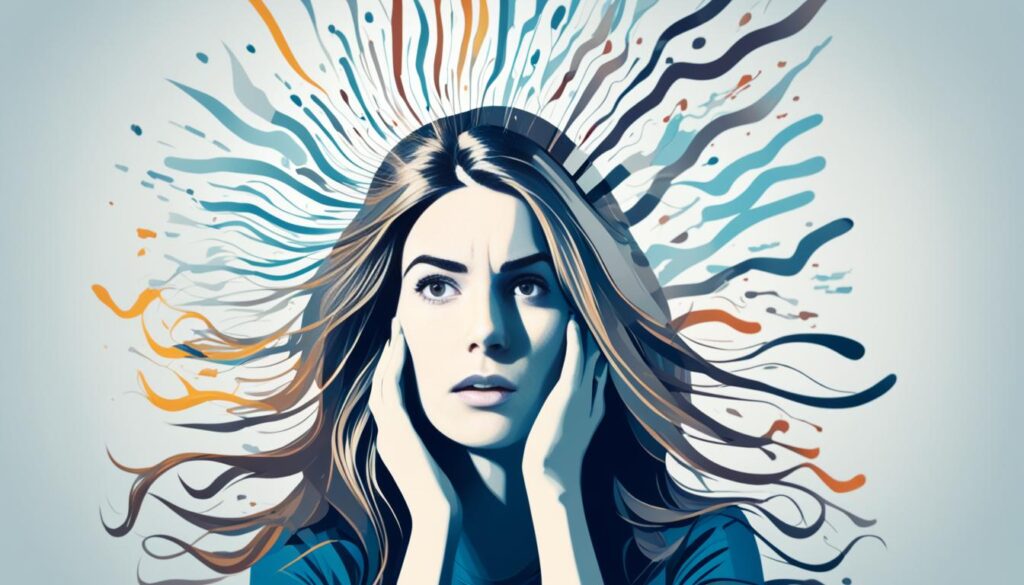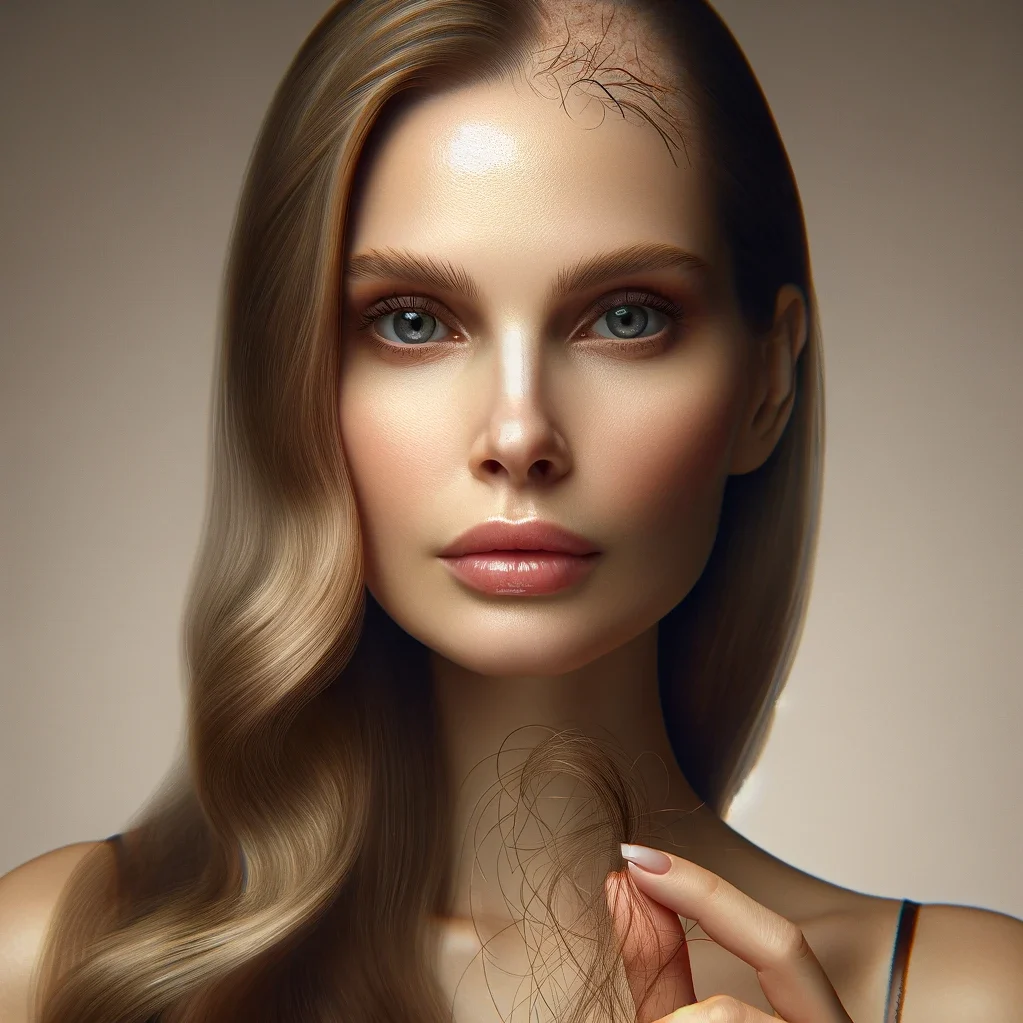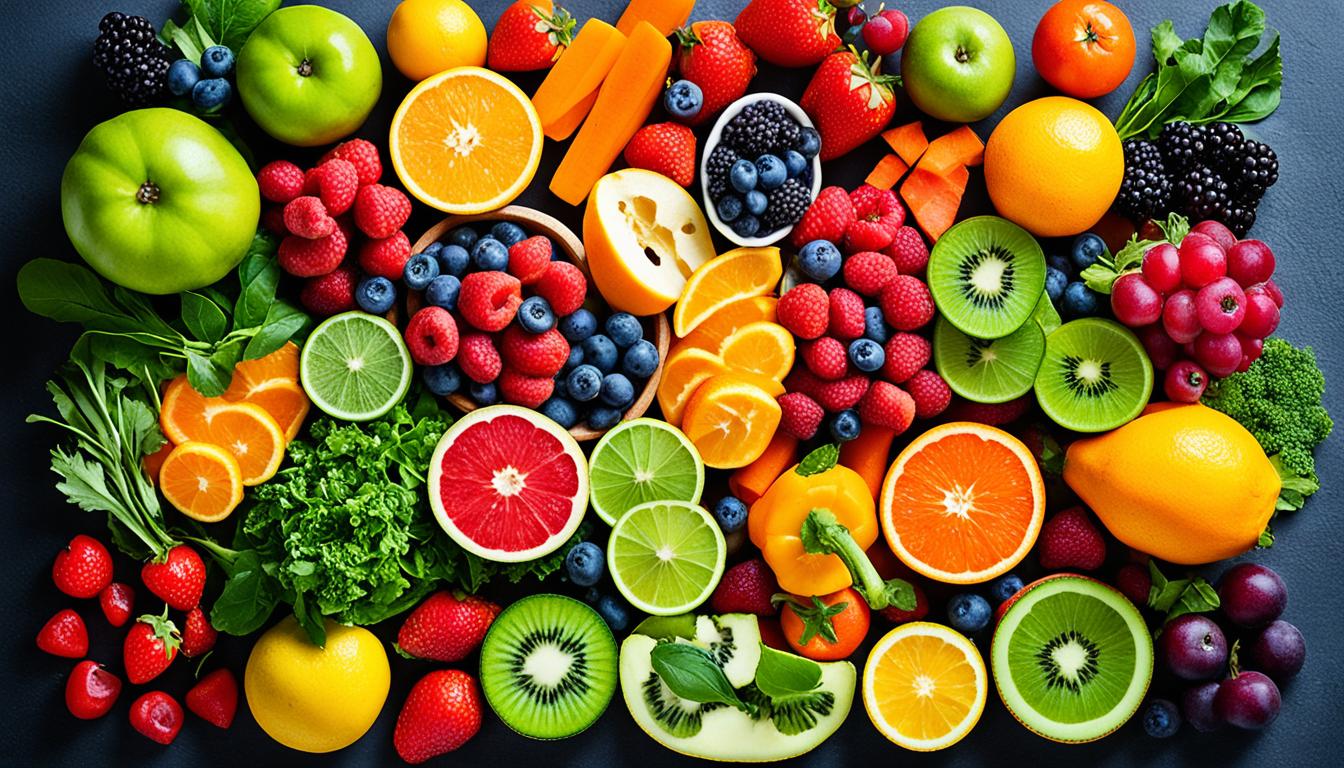Did you know that stress-related hair loss affects millions of people worldwide? The impact of stress on our bodies extends beyond just our mental well-being. Stress-induced hair loss, also known as telogen effluvium, can cause significant hair thinning and bald patches, leading to a loss of self-confidence and emotional distress.
But fear not! There are natural solutions to combat stress-related hair loss, and one of the most effective approaches is through the power of vitamins. By nourishing your body with the right vitamins and minerals, you can restore the health of your hair, combat stress-induced hair loss, and boost your self-esteem.
Understanding Stress-Related Hair Loss
Stress can have a profound impact on our overall well-being, and one area where it can manifest is in our hair. The causes of stress-related hair loss are multifaceted, with the stress hormone cortisol playing a significant role. When stress levels escalate, our bodies go into survival mode, redirecting resources away from non-essential functions like hair growth. This redirection can lead to a condition known as telogen effluvium, where hair follicles enter a resting phase and result in weakened and thinning hair.
Another stress-induced hair loss condition is Trichotillomania, characterized by the compulsive urge to pull out one’s own hair. Stress is often an underlying trigger for this condition, and it can cause significant damage to the hair follicles and result in hair loss.
In some cases, stress can lead to the development of Alopecia Areata, an autoimmune disorder that attacks the hair follicles, causing bald spots and thinning hair. The exact relationship between stress and this condition is not fully understood, but it is believed that stress can be a trigger that sets off an immune response.
Understanding these mechanisms of stress-related hair loss is crucial for individuals experiencing hair loss due to stress. It enables them to recognize the underlying causes and seek appropriate treatment options to address the issue.
“Stress can have a profound impact on our overall well-being, and one area where it can manifest is in our hair.”
The Impact of Stress on Hair
Stress can inhibit new hair growth and disrupt the hair cycle, leading to various forms of hair loss. The stress hormone cortisol, released during times of stress, plays a significant role in these processes. When cortisol levels are elevated, hair follicles can enter a prolonged resting phase, known as telogen effluvium, resulting in hair thinning and shedding. This condition can last for several months before the hair growth cycle resumes.
Additionally, stress-induced behaviors such as Trichotillomania, where individuals compulsively pull out their own hair, can cause damage to the hair follicles and lead to hair loss. The repetitive pulling can weaken the follicles, resulting in permanent hair loss if left untreated.
Furthermore, stress can trigger autoimmune responses in the body, such as in the case of Alopecia Areata. This condition causes the immune system to attack hair follicles, leading to patchy hair loss.
It is essential to recognize the impact of stress on hair and to address the underlying causes to effectively manage stress-related hair loss.

Summary of Stress-Related Hair Loss Causes
| Cause | Description |
|---|---|
| Telogen Effluvium | A condition where stress hormone cortisol pushes hair follicles into a prolonged resting phase, resulting in hair thinning and shedding. |
| Trichotillomania | A compulsive urge to pull out one’s own hair due to stress, leading to damaged hair follicles and hair loss. |
| Alopecia Areata | An autoimmune disorder triggered by stress that causes bald spots and patchy hair loss as the immune system attacks hair follicles. |
Using Supplements for Stress-Induced Hair Loss
Dealing with the root cause of stress is crucial for addressing stress-induced hair loss. Supplements can play a significant role in providing the necessary nutrients to combat hair loss and promote hair growth. One effective supplement for stress-related hair loss is Ginkgo Biloba B+. This natural remedy has shown great potential in supporting hair follicle health and aiding in hair growth.
Ginkgo Biloba, a potent antioxidant found in Ginkgo Biloba B+, protects the hair and scalp from stress-related damage and inflammation. It helps regulate cortisol levels, manage stress, and support the overall condition of the hair. By incorporating Ginkgo Biloba B+ into your daily routine, you can provide targeted support for stress-induced hair loss.
Aside from Ginkgo Biloba B+, there are other supplements that can also contribute to hair regrowth and overall health. Consider incorporating supplements such as Super Greens, which provide a nutrient-rich blend of vitamins, minerals, and antioxidants. Super Greens can help improve overall wellness, strengthen the immune system, and promote healthy hair growth.
Everyday Wellness is another supplement that can support hair health. It is formulated with essential vitamins, minerals, and antioxidants to provide comprehensive nutritional support. Including Everyday Wellness in your daily routine can help address nutritional deficiencies and contribute to the overall health of your hair.
Remember, supplements can enhance your efforts in combatting stress-induced hair loss, but it is essential to maintain a healthy lifestyle and address the root causes of stress. Consult with a healthcare professional to ensure the supplements you choose are safe and suitable for your individual needs.
Benefits of Using Supplements for Stress-Induced Hair Loss:
- Supports hair follicle health and aids in hair growth.
- Protects the hair and scalp from stress-related damage and inflammation.
- Regulates cortisol levels and manages stress.
- Improves overall health and wellness.
- Addresses nutritional deficiencies that may contribute to hair loss.
“Using supplements like Ginkgo Biloba B+ can provide the necessary nutrients to combat hair loss and promote hair growth.”
Supplement Comparison
| Supplement | Benefits |
|---|---|
| Ginkgo Biloba B+ |
|
| Super Greens |
|
| Everyday Wellness |
|

Best Vitamins for Hair Growth
Certain vitamins play a crucial role in promoting hair growth. By incorporating these essential vitamins into your diet, you can nourish your hair follicles and support healthy hair growth.
Biotin
Biotin, also known as vitamin B7, stimulates the production of keratin, the protein that makes up the structure of your hair. Increasing your biotin intake can promote follicle growth and improve the overall health of your hair.
Vitamin A
Vitamin A helps moisturize the scalp and keeps hair follicles healthy. It also plays a role in the production of sebum, which helps to condition and protect the hair.
Vitamin C
Vitamin C aids in preventing hair damage caused by oxidative stress. It is also necessary for the production of collagen, a protein that helps strengthen and support the structure of the hair.
Vitamin D
A deficiency in vitamin D can lead to hair loss conditions such as alopecia. Ensuring an adequate intake of vitamin D is essential for maintaining healthy hair follicles.
Vitamin E
Vitamin E acts as a powerful antioxidant that helps protect the hair from oxidative stress and promotes hair growth. It also improves blood circulation to the scalp, ensuring that essential nutrients reach the hair follicles.
Iron
A deficiency in iron can result in hair loss. Iron is vital for the production of hemoglobin, a protein that carries oxygen to the hair follicles, promoting hair growth.
Zinc
Zinc is essential for the growth and development of healthy hair. It helps regulate hormone levels and plays a role in protein synthesis, which is necessary for hair growth.
By including these vitamins in your diet or taking supplements, you can support your hair’s health and promote optimal hair growth.
How Long Do Hair Growth Vitamins Take to Work?
Hair growth vitamins are a popular option for individuals looking to address hair loss and promote hair growth. However, it is important to have realistic expectations when it comes to the timeline and effectiveness of these supplements.
The duration of time it takes for hair growth vitamins to work can vary from person to person. While some individuals may notice improvements in a relatively short period, others may need to wait several months before seeing any noticeable changes.
The effectiveness of hair growth vitamins is influenced by several factors. The underlying cause of hair loss, such as stress, nutrient deficiencies, or hormonal imbalances, can significantly impact the timeline for results. Additionally, genetics, individual response to supplements, and overall diet also play a role in the success rate of hair growth vitamins.
It is crucial to consult with a healthcare professional before starting any hair growth supplement regimen. They can help determine the underlying cause of hair loss and provide personalized guidance on the most suitable approach. In some cases, supplements may not be the most effective solution, and alternative treatments may be recommended.
Table: Factors Influencing the Effectiveness and Timeline of Hair Growth Vitamins
| Factors | Influence on Effectiveness and Timeline |
|---|---|
| Underlying Cause of Hair Loss | Different causes require varying amounts of time to address |
| Genetics | Individual response to supplements can be influenced by genetic factors |
| Diet | A balanced diet is essential for optimal hair growth and supplement effectiveness |
| Individual Response | Some individuals may experience faster results, while others may require more time |
While hair growth vitamins can be an effective component of a comprehensive hair care routine, it is important to manage expectations and be patient throughout the process. Consistency with supplements and following a healthy lifestyle can maximize their potential benefits.
Remember, individual results may vary, and it is essential to consult with a healthcare professional for personalized advice. They can help evaluate the underlying causes of hair loss and recommend appropriate treatments or interventions.
Benefits and Limitations of Nutritional Supplements for Hair Loss
Nutritional supplements can potentially help treat certain types of hair loss, providing additional support to the body’s natural processes. However, it is important to be aware of the limited data available on the efficacy and safety of these supplements. While some supplements, such as zinc and tocotrienols, have shown promise in promoting hair growth, it is crucial to approach them with caution and an understanding of their limitations.
Studies investigating the effectiveness of hair loss supplements often face certain limitations, including small sample sizes and variability in study design. Due to these factors, it can be challenging to draw definitive conclusions about the true effectiveness of these supplements. It is essential to consider these limitations and interpret the findings with caution.
Before embarking on a hair loss supplement regimen, it is highly recommended to consult with a healthcare professional. They can provide valuable insights tailored to your specific needs and help assess the risks and benefits associated with these supplements.
Key Points:
– Nutritional supplements can potentially help with hair loss.
– Limited data is available on the efficacy and safety of these supplements.
– Studies investigating their effectiveness have limitations.
– Consulting with a healthcare professional is crucial before starting any hair loss supplement.
Maintaining a Healthy Diet for Hair Loss Prevention
Alongside supplements, maintaining a healthy diet can play a critical role in preventing hair loss.
Increasing protein and iron intake can promote hair health and growth. Foods rich in protein and iron include eggs, red meat, lentils, spinach, and oysters.
A well-balanced diet that includes a variety of fruits, vegetables, whole grains, and healthy fats can provide the necessary nutrients for healthy hair growth.
Protein and Iron for Hair Health
Protein is essential for hair structure and growth. It helps strengthen the hair strands and prevent breakage. Incorporating lean sources of protein, such as chicken, fish, and tofu, can support healthy hair growth. Iron is also crucial for hair health as it helps transport oxygen to the hair follicles. Including iron-rich foods like beans, nuts, and fortified cereals can ensure proper iron levels for optimal hair growth.
“A well-balanced diet that includes a variety of nutrients is essential for maintaining healthy hair.”
Foods for Healthy Hair Growth
In addition to protein and iron, certain foods can provide vitamins and minerals that promote healthy hair growth. Citrus fruits, such as oranges and strawberries, are rich in vitamin C, which aids in collagen production and strengthens hair. Leafy green vegetables like spinach and kale are high in vitamins A and E, which nourish the scalp and protect against hair damage. Healthy fats found in avocados, nuts, and seeds contribute to shiny, moisturized hair.
Ensuring a well-rounded diet that includes these nutrient-dense foods can help prevent hair loss and promote overall hair health.
Conclusion
Stress-related hair loss can be a challenging issue to deal with, but there are effective solutions available. By incorporating the best vitamins for hair growth, such as biotin, vitamin A, vitamin C, vitamin D, vitamin E, iron, and zinc into your daily routine, you can support your hair’s health and promote growth. These vitamins play essential roles in maintaining strong, nourished hair follicles and preventing hair loss caused by stress.
In addition to vitamins, natural remedies can also help combat stress-induced hair loss. Consider using supplements like Ginkgo Biloba B+, which provides targeted support for stress-related hair loss. Ginkgo Biloba B+ supports the health of hair follicles and aids in hair growth by supplying the necessary nutrients and antioxidants. These natural remedies can be a valuable addition to your hair care routine.
While incorporating vitamins and natural remedies can be beneficial, it is crucial to consult with a healthcare professional to determine the best approach for addressing your specific hair loss concerns. They can provide personalized guidance and help you develop a comprehensive plan that includes stress management techniques, dietary adjustments, and the use of appropriate supplements.
FAQ
What are the best vitamins for hair loss due to stress?
The best vitamins for hair loss due to stress include biotin, vitamin A, vitamin C, vitamin D, vitamin E, iron, and zinc. These vitamins support hair growth and promote overall hair health.
How does stress cause hair loss?
Stress can cause hair loss through various mechanisms, including inhibiting new hair growth and damaging hair follicles. It can lead to conditions such as telogen effluvium, trichotillomania, and alopecia areata.
Can supplements help with stress-induced hair loss?
Yes, supplements like Ginkgo Biloba B+ can support hair follicle health and aid in hair growth. They provide essential nutrients that combat hair loss caused by stress.
What are the best vitamins for hair growth?
The best vitamins for hair growth are biotin, vitamin A, vitamin C, vitamin D, vitamin E, iron, and zinc. These vitamins promote hair health, stimulate keratin production, and support follicle growth.
How long does it take for hair growth vitamins to work?
Hair growth vitamins are not overnight solutions and may take months before noticeable improvements are seen. The timeline for results varies depending on various factors, including the underlying cause of hair loss and individual response.
Are nutritional supplements effective for treating hair loss?
Nutritional supplements can potentially help treat certain types of hair loss. However, the effectiveness and safety of these supplements have limited data. It is important to consult with a healthcare professional before starting any hair loss supplements.
How can a healthy diet prevent hair loss?
Maintaining a healthy diet that includes protein and iron-rich foods can promote hair health and growth. Increasing protein and iron intake through eggs, red meat, lentils, spinach, and oysters can support healthy hair growth.
What are some stress-related hair loss solutions?
Stress-related hair loss solutions include incorporating the best vitamins for hair loss, such as biotin, vitamin A, vitamin C, vitamin D, vitamin E, iron, and zinc. Additionally, using supplements like Ginkgo Biloba B+ and maintaining a healthy diet can support hair health and growth.

